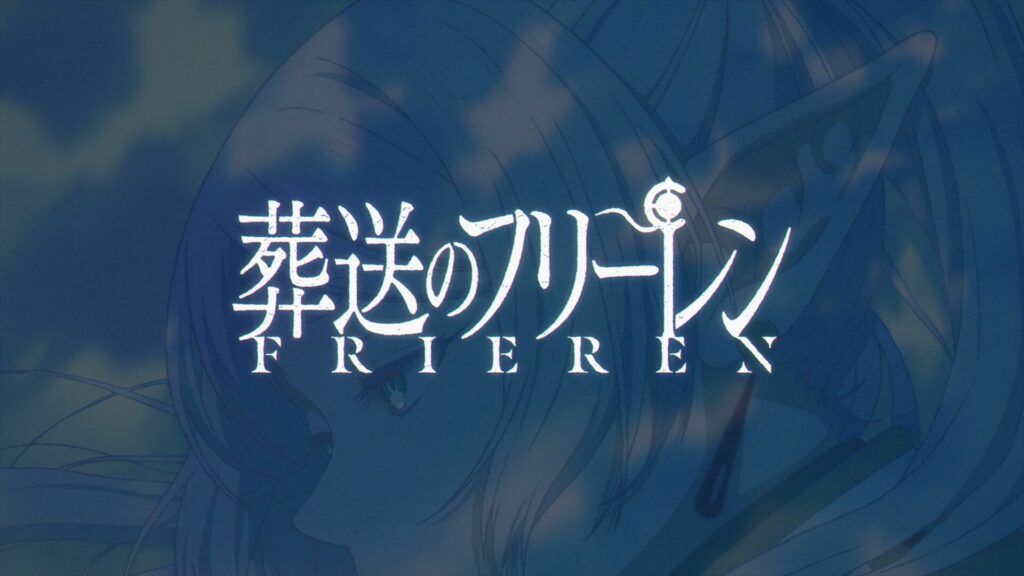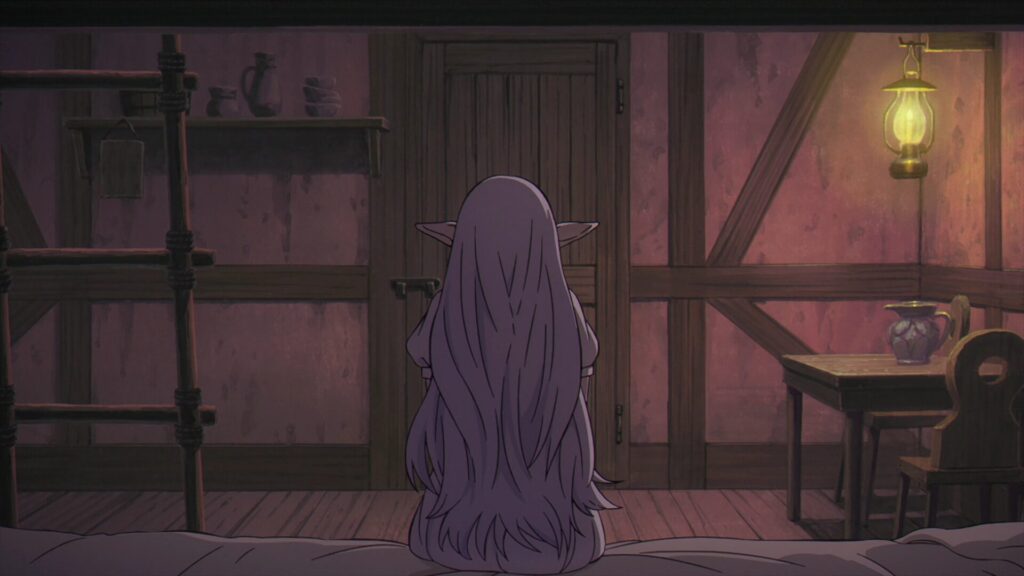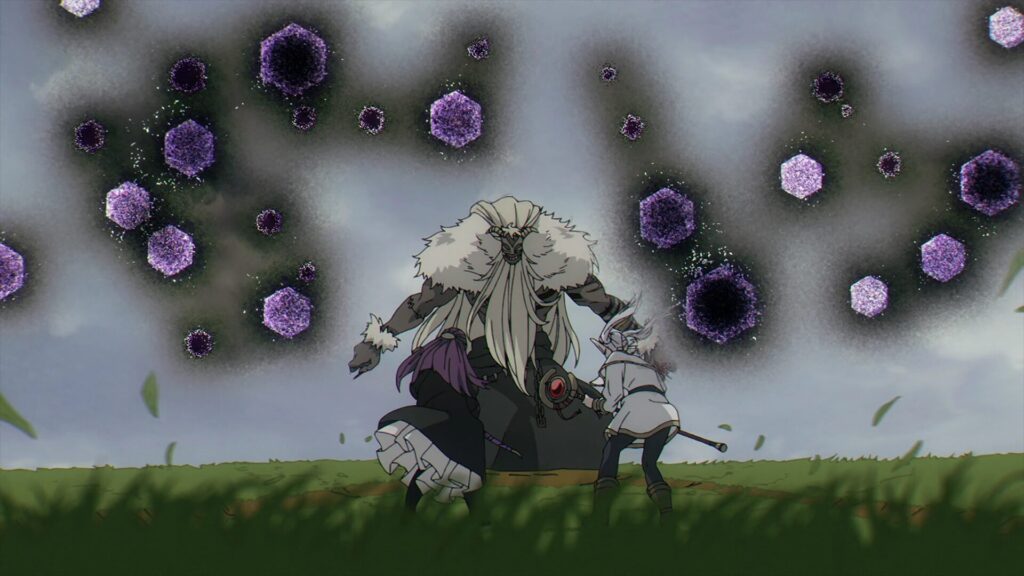
- 『Frieren: Beyond Journey’s End』Episode 3 – What You Can Do Now : 今(いま) できることを
- 🗣️ Quote #1 – She’s Hiding Something Again
- 🗣️ Quote #2 – A Rare Expression from Frieren
- 🗣️ Quote #3 – Getting to Know Each Other
- 🗣️ Quote #4 – I’m Happy You Tried to Know Me
- 🗣️ Quote #5 – Retracing the Past Before It Fades
- 🗣️ Quote #6 – The Strange Power of Defensive Magic
- 🗣️ Quote #7 – Zoltraak: A Spell That Shattered Defenses
- 🗣️ Quote #8 – When Magic Grew Stronger Than Death
- 🗣️ Quote #9 – Knowing How to Respond
- 🗣️ Quote #10 – Who Believed in Whom
- ✨ Summary – A Journey Made of Memories and Effort
『Frieren: Beyond Journey’s End』Episode 3 – What You Can Do Now : 今(いま) できることを
Fern goes shopping in town with Frieren.
ふぇるん は ふりーれん と いっしょに まちで かいもの を します。
フェルンはフリーレンと一緒に街で買い物をします。
Fern buys daily necessities and makes arrangements for their inn.
ふぇるん は しゅくはく の じゅんび や ひつような ぶっし を かいます。
フェルンは宿泊の準備や必要な物資を買います。
Frieren buys strange things like herbs that melt clothes and unnecessary books.
ふりーれん は ふく を とかす へんな やくそう や よけいな ほん を かいます。
フリーレンは服を溶かす変な薬草や余計な本を買います。
Fern worries that Frieren is hiding something from her.
ふぇるん は ふりーれん が なにを かくしているのか しんぱい します。
フェルンはフリーレンが何を隠しているのか心配します。
The truth is, Frieren remembered that it’s Fern’s birthday.
じつは、 ふりーれん は ふぇるん の たんじょうび を おぼえて いました。
実は、フリーレンはフェルンの誕生日を覚えていました。
Frieren takes Fern to a dessert shop and gives her a hair ornament.
ふりーれん は すいーつ の おみせ に ふぇるん を さそい、 かみかざり を ぷれぜんと します。
フリーレンはスイーツのお店にフェルンを誘い、髪飾りをプレゼントします。
Fern is deeply moved and says she’s happiest that Frieren tried to get to know her.
ふぇるん は とても うれしくて、 しろう と してくれたこと が いちばん うれしい と いいます。
フェルンはとてもうれしくて、「知ろうとしてくれたことがいちばんうれしい」と言います。
📚 Scene Vocabulary
ぶっし(物資) /bu.sshi/ – Noun
Meaning: Supplies like food, tools, or medicine used in travel or adventure.
しんぱい(心配) /shin.pai/ – Noun/Verb
Meaning: Worry or concern, especially when you feel anxious about someone or something.
たんじょうび(誕生日) /tan.jou.bi/ – Noun
Meaning: Birthday; the day someone was born and usually celebrated with gifts or parties.
おぼえる(覚える) /o.bo.e.ru/ – Verb
Meaning: To remember or memorize something; to keep it in your mind.
ぷれぜんと /pu.re.zen.to/ – Noun
Meaning: A present or gift; a thing you give to someone to show thanks or celebrate.
うれしい(嬉しい) /u.re.shi.i/ – Adjective
Meaning: Happy or glad; a feeling of joy when something nice happens.
🗣️ Quote #1 – She’s Hiding Something Again

これは私に何か隠している時の顔だ。
フリーレン様との付き合いは長い。
こういう時はろくなことがない。
決まって、余計な物を買ってくるんだ。
Great. That’s the face she makes when she’s hiding something from me.
I’ve known Mistress Frieren for a long time.
Nothing good happens when she makes that face.
She’s plotting to buy something we don’t need.
これは わたし に なにか かくしている とき の かお だ。
ふりーれんさま との つきあい は ながい。
こういう とき は ろくな こと が ない。
きまって、 よけいな もの を かって くるん だ。
kore wa watashi ni nanika kakushite iru toki no kao da.
Furīren-sama to no tsukiai wa nagai.
kou iu toki wa rokuna koto ga nai.
kimatte, yokei na mono o katte kuru n da.
🌟 Waku Waku Word Dive
かくす(隠す) /ka.ku.su/ – Verb
Meaning: To hide something, such as an object, a fact, or a feeling.
つきあい(付き合い) /tsu.ki.a.i/ – Noun
Meaning: Relationship or connection with someone over time.
ろくな〜ない /ro.ku.na〜na.i/ – Expression
Meaning: Nothing good; used to express that something is always bad or disappointing.
よけい(余計) /yo.kei/ – Adjective/Noun
Meaning: Unnecessary or excessive; more than needed.
かお(顔) /ka.o/ – Noun
Meaning: Face; often refers to facial expression or mood.
かってくる(買ってくる) /ka.tte.ku.ru/ – Verb
Meaning: To go buy something and return; often used for errands.
📘 Mini Grammar Boost
〜時の顔
Ex: 隠している時の顔
Tip: A common way to describe someone’s typical facial expression during a certain situation.
〜との付き合いは長い
Ex: フリーレン様との付き合いは長い
Tip: Means “I’ve known someone for a long time”; shows familiarity and history.
ろくな〜ない
Ex: ろくなことがない
Tip: A fixed negative expression meaning “nothing good happens” or “always bad things.”
決まって〜する
Ex: 決まって、余計な物を買ってくる
Tip: Implies a repeated pattern or habit—”always ends up doing X.”
🔀 Slash Reading – Japanese / English
これは 私(わたし)に 何(なに)か 隠(かく)している 時(とき)の 顔(かお)だ。
That’s the face she makes when she’s hiding something from me.
フリーレン様(さま)との 付き合(つきあ)いは 長(なが)い。
I’ve known Mistress Frieren for a long time.
こういう 時(とき)は ろくな ことが ない。
Nothing good happens when she makes that face.
決(き)まって、 余計(よけい)な 物(もの)を 買(か)って くるんだ。
She always ends up buying something unnecessary.
🗣️ Quote #2 – A Rare Expression from Frieren

え、何その顔?
私、フリーレン様のあんなに悩んでる顔、見たことないんだけど。
Huh?! What’s that face?
In all these years, I’ve never seen Mistress Frieren look so troubled before.
え、 なに その かお?
わたし、 ふりーれんさま の あんなに なやんでる かお、 みたこと ないん だけど。
e, nani sono kao?
watashi, Furīren-sama no anna ni nayanderu kao, mita koto nai n da kedo.
🌟 Waku Waku Word Dive
なやむ(悩む) /na.ya.mu/ – Verb
Meaning: To be troubled or worried; to struggle mentally with something.
かお(顔) /ka.o/ – Noun
Meaning: Face; also refers to facial expressions or emotions shown on the face.
みたことがない(見たことがない) /mi.ta ko.to ga na.i/ – Phrase
Meaning: I’ve never seen (it) before; used to express new or surprising experiences.
その /so.no/ – Pronoun
Meaning: That (near the listener); used to refer to something just mentioned or visible.
あんなに /an.na ni/ – Adverb
Meaning: So much; to such a degree (often used for emphasis).
だけど /da.ke.do/ – Conjunction
Meaning: But; though; used to add contrast or soft disagreement.
📘 Mini Grammar Boost
〜その顔
Ex: 何その顔?
Tip: A casual way to comment on someone’s unexpected or strange expression—“What’s with that face?”
〜あんなに〜
Ex: あんなに悩んでる顔
Tip: “So much” or “to that extent”; expresses strong degree or intensity.
〜見たことない
Ex: 見たことないんだけど
Tip: Means “I’ve never seen it before”; describes something surprising or new to the speaker.
🔀 Slash Reading – Japanese / English
え、 何(なに) その 顔(かお)?
Huh?! What’s that face?
私(わたし)、 フリーレン様(さま)の あんなに 悩(なや)んでる 顔(かお)、 見(み)たこと ないんだけど。
I’ve never seen Mistress Frieren look that troubled before.
🗣️ Quote #3 – Getting to Know Each Other

何年一緒に旅をしていると思っているんだ。
なんとなく、わかるさ。
私は、みんなのこと何もわからない。
なら、知ってもらえるように頑張るとするかな。
You travel with someone for years, and you pick up on things.
I can just tell with you.
I can’t tell what any of you are thinking.
Then we should put in more effort so you can get to know us better.
なんねん いっしょに たび を している と おもっているん だ。
なんとなく、 わかる さ。
わたし は、 みんな の こと なにも わからない。
なら、 しって もらえる ように がんばる と する かな。
nan-nen issho ni tabi o shite iru to omotte iru n da.
nantonaku, wakaru sa.
watashi wa, minna no koto nanimo wakaranai.
nara, shitte moraeru you ni ganbaru to suru kana.
🌟 Waku Waku Word Dive
たび(旅) /ta.bi/ – Noun
Meaning: Journey or trip, especially long-term or meaningful travel.
なんとなく /nan.to.na.ku/ – Adverb
Meaning: Somehow; without clear reason but with a feeling.
わかる(分かる) /wa.ka.ru/ – Verb
Meaning: To understand or sense something.
がんばる(頑張る) /gan.ba.ru/ – Verb
Meaning: To try hard; to make a strong effort.
しってもらう(知ってもらう) /shi.tte.mo.ra.u/ – Phrase
Meaning: To be known or understood by someone else.
みんな /min.na/ – Noun/Pronoun
Meaning: Everyone; all of you/them.
📘 Mini Grammar Boost
〜と思っているんだ
Ex: 何年一緒に旅をしていると思っているんだ
Tip: Adds emphasis to a rhetorical question—“Haven’t we traveled together for years?”
〜ように頑張る
Ex: 知ってもらえるように頑張る
Tip: Expresses intention—“I’ll try so that…”
〜わからない
Ex: みんなのこと何もわからない
Tip: Strong negative—“I really don’t understand anything about you all.”
🔀 Slash Reading – Japanese / English
何年(なんねん) 一緒(いっしょ)に 旅(たび)を している と 思(おも)っているんだ。
You travel with someone for years, and you pick up on things.
なんとなく、 分(わ)かる さ。
I can just tell with you.
私(わたし)は、 みんな の こと 何(なに)も 分(わ)からない。
I can’t tell what any of you are thinking.
なら、 知(し)って もらえる ように 頑張(がんば)る と する かな。
Then we should put in more effort so you can get to know us better.
🗣️ Quote #4 – I’m Happy You Tried to Know Me

フリーレン様は、どうしようもない程に鈍い方のようなので、はっきりと伝えます。
あなたが私を知ろうとしてくれたことが、たまらなくうれしいのです。
知ろうとしただけなのに?
フリーレン様は本当に人の感情がわかっていませんね。
Very well, and because you’re hopelessly dense when it comes to these things, allow me to be clear.
I am overjoyed that you’re trying to get to know me.
That is a gift in itself.
Simply trying means that much?
Maybe we should find you a spell for understanding people’s feelings.
ふりーれんさま は、 どうしようもない ほど に にぶい かた の よう なので、 はっきり と つたえます。
あなた が わたし を しろう と して くれた こと が、 たまらなく うれしい のです。
しろう と した だけ なのに?
ふりーれんさま は ほんとうに ひと の かんじょう が わかって いません ね。
Furīren-sama wa, dō shiyō mo nai hodo ni nibui kata no yō na no de, hakkiri to tsutaemasu.
Anata ga watashi o shirō to shite kureta koto ga, tamaranaku ureshii no desu.
Shirō to shita dake na noni?
Furīren-sama wa hontō ni hito no kanjō ga wakatte imasen ne.
🌟 Waku Waku Word Dive
にぶい(鈍い) /ni.bu.i/ – Adjective
Meaning: Dull or slow to notice feelings or situations
つたえる(伝える) /tsu.ta.e.ru/ – Verb
Meaning: To tell or convey something clearly
しろうとする(知ろうとする) /shi.ro.u.to.su.ru/ – Phrase
Meaning: To try to get to know or understand
たまらない /ta.ma.ra.na.i/ – Adjective
Meaning: Overwhelming; can’t hold back (positive or negative feelings)
かんじょう(感情) /kan.jou/ – Noun
Meaning: Emotion or feeling
ほんとうに(本当に) /hon.tou.ni/ – Adverb
Meaning: Truly; really
📘 Mini Grammar Boost
〜ようなので
Ex: 鈍い方のようなので
Tip: “Because it seems that…” — shows assumption leading to action
〜してくれたことが〜うれしい
Ex: 知ろうとしてくれたことがうれしい
Tip: Used to show gratitude for someone’s effort toward you
〜だけなのに
Ex: 知ろうとしただけなのに
Tip: “Even though it was just…” — expresses surprise that a small action meant so much
〜がわかっていませんね
Ex: 感情がわかっていませんね
Tip: Soft but firm way to say “you don’t understand something”
🔀 Slash Reading – Japanese / English
フリーレン様(さま)は、 どうしようもない 程(ほど)に 鈍(にぶ)い 方(かた)の ようなので、 はっきりと 伝(つた)えます。
Very well, and because you’re hopelessly dense when it comes to these things, allow me to be clear.
あなたが 私(わたし)を 知(し)ろうと して くれた ことが、 たまらなく 嬉(うれ)しいのです。
I am overjoyed that you’re trying to get to know me.
知(し)ろうと した だけなのに?
Simply trying means that much?
フリーレン様(さま)は 本当(ほんとう)に 人(ひと)の 感情(かんじょう)が 分(わ)かって いませんね。
Maybe we should find you a spell for understanding people’s feelings.
🗣️ Quote #5 – Retracing the Past Before It Fades

ところでフリーレン様、この旅って何か目的はあるんですか?
特にないよ。魔法収集の趣味の旅だからね。
でも、できる限りはヒンメルたちとの冒険の痕跡をたどっていきたいかな。風化する前にね。
Tell me the truth, Mistress.
Does our journey have a notable purpose this time?
Not especially.
Hopefully, we’ll be able to find some decent spells, though.
That, and whenever possible, I’d like to retrace the adventures I had with Himmel and the others.
ところで ふりーれんさま、 この たび って なにか もくてき は あるん です か?
とくに ない よ。 まほう しゅうしゅう の しゅみ の たび だから ね。
でも、 できる かぎり は ひんめる たち との ぼうけん の こんせき を たどって いきたい かな。
ふうか する まえ に ね。
tokoro de Furīren-sama, kono tabi tte nanika mokuteki wa aru n desu ka?
toku ni nai yo. mahou shuushuu no shumi no tabi dakara ne.
demo, dekiru kagiri wa Hinmeru-tachi to no bouken no konseki o tadotte ikitai kana.
fuuka suru mae ni ne.
🌟 Waku Waku Word Dive
もくてき(目的) /mo.ku.te.ki/ – Noun
Meaning: Purpose; goal; the reason for doing something
しゅうしゅう(収集) /shuu.shuu/ – Noun
Meaning: Collection; gathering things such as items or knowledge
こんせき(痕跡) /kon.se.ki/ – Noun
Meaning: Traces; remains or signs left behind
たどる(辿る) /ta.do.ru/ – Verb
Meaning: To trace; to follow the path of something
ふうか(風化) /fu.u.ka/ – Noun/Verb
Meaning: Weathering or fading away, especially of memories or meaning
できるかぎり /de.ki.ru.ka.gi.ri/ – Expression
Meaning: As much as possible; to the extent one can
📘 Mini Grammar Boost
〜って何か〜あるんですか
Ex: この旅って何か目的はあるんですか?
Tip: Polite way to ask if something has a particular purpose
〜だけどね
Ex: 魔法収集の趣味の旅だからね
Tip: Adds casual explanation or justification
〜できる限り
Ex: できる限りは〜たどっていきたい
Tip: “As much as possible”; often used to show effort or intention
〜前に
Ex: 風化する前にね
Tip: “Before it fades” — timing is important to act early
🔀 Slash Reading – Japanese / English
ところで フリーレン様(さま)、 この 旅(たび)って 何(なに)か 目的(もくてき)は あるんですか?
Tell me the truth, Mistress. Does our journey have a notable purpose this time?
特(とく)に ない よ。 魔法(まほう)収集(しゅうしゅう)の 趣味(しゅみ)の 旅(たび)だから ね。
Not especially. Hopefully, we’ll be able to find some decent spells, though.
でも、 できる 限(かぎ)り は ヒンメルたち との 冒険(ぼうけん)の 痕跡(こんせき)を 辿(たど)って いきたい かな。
That, and whenever possible, I’d like to retrace the adventures I had with Himmel and the others.
風化(ふうか)する 前(まえ)に ね。
Before it fades.
🗣️ Quote #6 – The Strange Power of Defensive Magic

防御魔法の練習ばかりですね。
生存率に直結するからね。
確かに、防御魔法一つでほとんどの攻撃魔法が防げますからね。
強力すぎて不思議です。
We’ve been practicing nothing but defense for ages.
Yes, to improve your odds of survival.
I guess that makes sense.
Being able to cast one defensive spell can protect you from most every offensive spell.
It’s eerie how powerful they are.
ぼうぎょ まほう の れんしゅう ばかり です ね。
せいぞんりつ に ちょっけつ する から ね。
たしかに、 ぼうぎょ まほう ひとつ で ほとんど の こうげき まほう が ふせげます から ね。
きょうりょく すぎて ふしぎ です。
bougyo mahou no renshuu bakari desu ne.
seizonritsu ni chokketsu suru kara ne.
tashika ni, bougyo mahou hitotsu de hotondo no kougeki mahou ga fusegemasu kara ne.
kyouryoku sugite fushigi desu.
🌟 Waku Waku Word Dive
ぼうぎょまほう(防御魔法) /bou.gyo.ma.hou/ – Noun
Meaning: Defensive magic; spells used to block or protect against attacks
れんしゅう(練習) /ren.shuu/ – Noun
Meaning: Practice; repeated training or drilling
せいぞんりつ(生存率) /sei.zon.ritsu/ – Noun
Meaning: Survival rate; chance of staying alive
ちょっけつ(直結) /chok.ketsu/ – Noun/Verb
Meaning: Directly linked or connected
ふせぐ(防ぐ) /fu.se.gu/ – Verb
Meaning: To defend or block; to prevent
ふしぎ(不思議) /fu.shi.gi/ – Noun/Adjective
Meaning: Strange; mysterious; something hard to believe
📘 Mini Grammar Boost
〜ばかりですね
Ex: 練習ばかりですね
Tip: “Nothing but…” — emphasizes repetition or exclusivity
〜に直結する
Ex: 生存率に直結する
Tip: “Directly affects” — often used for serious or measurable impact
〜一つで〜が〜できる
Ex: 魔法一つで防げます
Tip: A natural way to express that one thing alone can accomplish something
〜すぎて〜
Ex: 強力すぎて不思議
Tip: “So [X] that it’s [Y]” — shows cause and surprising result
🔀 Slash Reading – Japanese / English
防御魔法(ぼうぎょまほう)の 練習(れんしゅう)ばかり ですね。
We’ve been practicing nothing but defense for ages.
生存率(せいぞんりつ)に 直結(ちょっけつ)する から ね。
Yes, to improve your odds of survival.
確(たし)かに、 防御魔法(ぼうぎょまほう)一(ひと)つで ほとんどの 攻撃魔法(こうげきまほう)が 防(ふせ)げます から ね。
I guess that makes sense. Being able to cast one defensive spell can protect you from most every offensive spell.
強力(きょうりょく)すぎて 不思議(ふしぎ)です。
It’s eerie how powerful they are.
🗣️ Quote #7 – Zoltraak: A Spell That Shattered Defenses

人類の防御魔法は、もちろん装備の魔法耐性さえも貫通し、人体を直接破壊する魔法だ。
この地方では、冒険者の4割、魔法使いに至っては7割が、ゾルトラークによって殺されたと言われている。
It can pierce not only defensive spells, but the most durable magic-resistant armors.
It directly targets and destroys the body.
It is said that in this region, 40 percent of their adventurers and 70 percent of their mages were killed by Zoltraak.
じんるい の ぼうぎょ まほう は、 もちろん そうび の まほう たいせい さえ も かんつう し、 じんたい を ちょくせつ はかい する まほう だ。
この ちほう では、 ぼうけんしゃ の よんわり、 まほうつかい に いたって は ななわり が、 ゾルトラーク に よって ころされた と いわれて いる。
jinrui no bougyo mahou wa, mochiron soubi no mahou taisei sae mo kantsuu shi, jintai o chokusetsu hakai suru mahou da.
kono chihou de wa, boukensha no yon-wari, mahoutsukai ni itatte wa nana-wari ga, Zorutoraaku ni yotte korosareta to iwarete iru.
🌟 Waku Waku Word Dive
かんつう(貫通) /kan.tsuu/ – Verb
Meaning: To pierce through; to penetrate completely
そうび(装備) /sou.bi/ – Noun
Meaning: Equipment; gear, especially armor or clothing in battle
たいせい(耐性) /tai.sei/ – Noun
Meaning: Resistance (to magic, disease, etc.)
ちょくせつ(直接) /cho.ku.se.tsuu/ – Adverb
Meaning: Directly; with no intermediary
はかい(破壊) /ha.ka.i/ – Noun/Verb
Meaning: Destruction; the act of breaking or ruining something
いたる(至る) /i.ta.ru/ – Verb
Meaning: To reach or extend to; used in “に至っては” for emphasis
📘 Mini Grammar Boost
〜さえも〜し
Ex: 魔法耐性さえも貫通し
Tip: “Even [X] can be overcome” — shows extremity or exception
〜を直接〜する
Ex: 人体を直接破壊する
Tip: Expresses direct effect—“to destroy the body directly”
〜に至っては
Ex: 魔法使いに至っては
Tip: Adds emphasis—“in the case of mages in particular…”
〜と言われている
Ex: 殺されたと言われている
Tip: Passive form for reported facts—“it is said that…”
🔀 Slash Reading – Japanese / English
人類(じんるい)の 防御魔法(ぼうぎょまほう)は、 もちろん 装備(そうび)の 魔法耐性(まほうたいせい)さえも 貫通(かんつう)し、 人体(じんたい)を 直接(ちょくせつ) 破壊(はかい)する 魔法(まほう)だ。
It can pierce not only defensive spells, but the most durable magic-resistant armors. It directly targets and destroys the body.
この 地方(ちほう)では、 冒険者(ぼうけんしゃ)の 四割(よんわり)、 魔法使(まほうつか)い に 至(いた)っては 七割(ななわり)が、 ゾルトラーク に よって 殺(ころ)された と 言(い)われて いる。
It is said that in this region, 40 percent of their adventurers and 70 percent of their mages were killed by Zoltraak.
🗣️ Quote #8 – When Magic Grew Stronger Than Death

大陸中の魔法使いが、ゾルトラークをこぞって研究・解析した。
わずか数年で、ゾルトラークは人類の魔法体系に組み込まれた。
新しい防御術式による強力な防御魔法が開発された。
装備による魔法耐性も格段に向上した。
ゾルトラークは人を殺す魔法ではなくなった。
Mages across the land studied and analyzed Zoltraak until they had a complete understanding of it.
In just a few years, your work was incorporated into humankind’s magic system.
New defensive spells with power like none before were developed in response.
The magic resistance offered by equipment has improved significantly as well.
These advances have made Zoltraak a death sentence no longer.
たいりくじゅう の まほうつかい が、 ゾルトラーク を こぞって けんきゅう・かいせき した。
わずか すうねん で、 ゾルトラーク は じんるい の まほうたいけい に くみこまれた。
あたらしい ぼうぎょ じゅつしき に よる きょうりょく な ぼうぎょ まほう が かいはつ された。
そうび に よる まほうたいせい も かくだん に こうじょう した。
ゾルトラーク は ひと を ころす まほう では なくなった。
tairikujuu no mahoutsukai ga, Zorutoraaku o kozotte kenkyuu / kaiseki shita.
wazuka suunen de, Zorutoraaku wa jinrui no mahou taikei ni kumikomareta.
atarashii bougyo jutsushiki ni yoru kyouryoku na bougyo mahou ga kaihatsu sareta.
soubi ni yoru mahou taisei mo kakudan ni koujou shita.
Zorutoraaku wa hito o korosu mahou de wa nakunatta.
🌟 Waku Waku Word Dive
けんきゅう(研究) /ken.kyuu/ – Noun/Verb
Meaning: Research; in-depth study for new understanding
かいせき(解析) /kai.se.ki/ – Noun
Meaning: Analysis; breaking down to understand mechanisms
たいけい(体系) /tai.kei/ – Noun
Meaning: System; organized structure (like a body of knowledge)
くみこむ(組み込む) /ku.mi.ko.mu/ – Verb
Meaning: To incorporate; to embed into a larger system
こうじょう(向上) /kou.jou/ – Noun/Verb
Meaning: Improvement; raising the level of performance
なくなる(無くなる) /na.ku.na.ru/ – Verb
Meaning: To disappear or cease to exist (in this case: “no longer be”)
📘 Mini Grammar Boost
〜をこぞって〜した
Ex: ゾルトラークをこぞって研究・解析した
Tip: “All together, eagerly” — often used to show widespread effort
〜に組み込まれた
Ex: 魔法体系に組み込まれた
Tip: Passive form — “was incorporated into”
〜による〜が〜された
Ex: 新しい防御術式による魔法が開発された
Tip: “Something was done by means of…” — formal explanatory tone
〜ではなくなった
Ex: 殺す魔法ではなくなった
Tip: “No longer [X]” — strong way to show a change or transformation
🔀 Slash Reading – Japanese / English
大陸中(たいりくじゅう)の 魔法使(まほうつか)いが、 ゾルトラーク を こぞって 研究(けんきゅう)・解析(かいせき)した。
Mages across the land studied and analyzed Zoltraak until they had a complete understanding of it.
わずか 数年(すうねん)で、 ゾルトラーク は 人類(じんるい)の 魔法体系(まほうたいけい)に 組(く)み込(こ)まれた。
In just a few years, your work was incorporated into humankind’s magic system.
新(あたら)しい 防御術式(ぼうぎょじゅつしき)による 強力(きょうりょく)な 防御魔法(ぼうぎょまほう)が 開発(かいはつ)された。
New defensive spells with power like none before were developed in response.
装備(そうび)による 魔法耐性(まほうたいせい)も 格段(かくだん)に 向上(こうじょう)した。
The magic resistance offered by equipment has improved significantly as well.
ゾルトラーク は 人(ひと)を 殺(ころ)す 魔法(まほう)では なくなった。
These advances have made Zoltraak a death sentence no longer.
🗣️ Quote #9 – Knowing How to Respond

防御の方の弱点に気づかれた。
フェルン、対処できるよね?
はい、練習でもう見ましたから。
He figured out the weakness of defensive magic.
Fern… you know what to do, don’t you?
Yes.
I remember from our practices.
ぼうぎょ の ほう の じゃくてん に きづかれた。
ふぇるん、 たいしょ できる よ ね?
はい、 れんしゅう で もう みました から。
bougyo no hou no jakuten ni kidzukareta.
Ferun, taisho dekiru yo ne?
hai, renshuu de mou mimashita kara.
🌟 Waku Waku Word Dive
じゃくてん(弱点) /ja.ku.ten/ – Noun
Meaning: Weak point; vulnerability
きづく(気づく) /ki.zu.ku/ – Verb
Meaning: To notice; to realize
たいしょ(対処) /tai.sho/ – Noun/Verb
Meaning: Handling; responding to a situation
れんしゅう(練習) /ren.shuu/ – Noun
Meaning: Practice; rehearsal
みる(見る) /mi.ru/ – Verb
Meaning: To see; to observe
もう /mou/ – Adverb
Meaning: Already; previously
📘 Mini Grammar Boost
〜に気づかれる
Ex: 弱点に気づかれた
Tip: Passive form — “was noticed” (by someone else)
〜できるよね?
Ex: 対処できるよね?
Tip: Soft confirmation — “You can handle it, right?”
〜でもう〜た
Ex: 練習でもう見ましたから
Tip: “I already saw it during practice” — emphasizes preparedness
🔀 Slash Reading – Japanese / English
防御(ぼうぎょ)の 方(ほう)の 弱点(じゃくてん)に 気(き)づかれた。
He figured out the weakness of defensive magic.
フェルン、 対処(たいしょ)できる よ ね?
Fern… you know what to do, don’t you?
はい、 練習(れんしゅう)で もう 見(み)ました から。
Yes. I remember from our practices.
🗣️ Quote #10 – Who Believed in Whom

この村の人たちは、ヒンメルを信じていたんだ。
よくわかりませんが……。
ヒンメル様は、フリーレン様を信じていたのだと思いますよ。
どうしたのですか?
別に。
His prophecy came to pass.
Himmel is who they believed in.
I don’t understand exactly.
But it seems to me that the person Himmel believed in all this time was you.
What is it, Mistress?
Nothing.
この むら の ひとたち は、 ひんめる を しんじて いた ん だ。
よく わかりません が……。
ひんめるさま は、 ふりーれんさま を しんじて いた の だ と おもいます よ。
どう した の です か?
べつ に。
kono mura no hitotachi wa, Hinmeru o shinjite ita n da.
yoku wakarimasen ga……
Hinmeru-sama wa, Furīren-sama o shinjite ita no da to omoimasu yo.
dou shita no desu ka?
betsu ni.
🌟 Waku Waku Word Dive
むら(村) /mu.ra/ – Noun
Meaning: Village; small rural community
しんじる(信じる) /shin.ji.ru/ – Verb
Meaning: To believe in; to trust
わかる(分かる) /wa.ka.ru/ – Verb
Meaning: To understand; to grasp
おもう(思う) /o.mo.u/ – Verb
Meaning: To think; to feel
どうしたのですか /dou.shi.ta.no.de.su.ka/ – Phrase
Meaning: What’s the matter? (polite)
べつに(別に) /be.tsu.ni/ – Phrase
Meaning: Nothing in particular; no reason
📘 Mini Grammar Boost
〜を信じていたんだ
Ex: ヒンメルを信じていたんだ
Tip: Past continuous + explanatory tone — “They had believed in…”
〜のだと思います
Ex: 信じていたのだと思いますよ
Tip: Polite form — “I think that… probably”
どうしたのですか?
Tip: A gentle, respectful way to ask “What’s wrong?”
〜別に
Ex: 別に
Tip: Casual, closed-off reply — “Nothing (really)” or “It’s nothing”
🔀 Slash Reading – Japanese / English
この 村(むら)の 人(ひと)たちは、 ヒンメル を 信(しん)じて いた んだ。
Himmel is who they believed in.
よく 分(わ)かりません が……。
I don’t understand exactly.
ヒンメル様(さま)は、 フリーレン様(さま)を 信(しん)じて いた のだ と 思(おも)います よ。
But it seems to me that the person Himmel believed in all this time was you.
どう した の です か?
What is it, Mistress?
別(べつ)に。
Nothing.
✨ Summary – A Journey Made of Memories and Effort
フリーレンは、ヒンメルたちとの 冒険(ぼうけん)の 痕跡(こんせき)を たどろうと していました。
Frieren wanted to retrace the adventures she had shared with Himmel and the others.
その 思(おも)いは、少(すこ)し ずつ 彼女(かのじょ)を 変(か)えていきます。
That wish is slowly changing her.
フェルンも また、 自分(じぶん)の 気持(きも)ちを 少(すこ)し ずつ 言葉(ことば)に できるように なってきました。
Fern, too, has begun to express her feelings little by little.
おたがいに「知(し)ろうとする」ことで、二人(ふたり)の 関係(かんけい)は 少(すこ)し ずつ 深(ふか)まっていきます。
As they try to understand one another, their bond continues to deepen.
その 成長(せいちょう)こそが、旅(たび)の 本当(ほんとう)の 宝物(たからもの)なのかもしれません。
Perhaps that growth is the true treasure of their journey.
🌟 Waku Waku Word Dive
こんせき(痕跡) /kon.se.ki/ – Noun
Meaning: Trace; sign; remaining clue of something past
しろうとする(知ろうとする) /shi.ro.u.to.su.ru/ – Phrase
Meaning: To try to understand or learn about someone/something
かんけい(関係) /kan.kei/ – Noun
Meaning: Relationship; human or causal connection
せいちょう(成長) /sei.chou/ – Noun
Meaning: Growth; personal or emotional development



